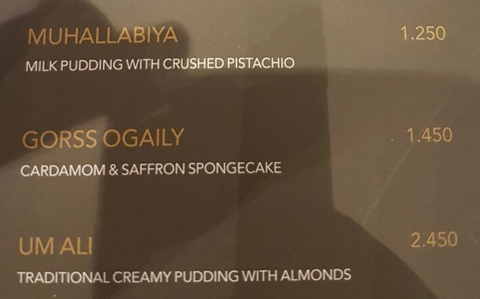 KUWAIT: A menu showing names of popular foods in Kuwait. — KUNA
KUWAIT: A menu showing names of popular foods in Kuwait. — KUNAKUWAIT: Could the names of some foods make them sound heavier, lighter, sweeter, or more delicious than others? This seems unlikely; after all, as Shakespeare said in Romeo and Juliet: What's in a name? That which we call a rose.. By any other name would smell as sweet.
Juliet is expressing the theory we call conventionalism: that a name for something is just an agreed-upon convention. Conventionalism is the norm in modern linguistics: Whether we call the ingredients in our breakfast scrambled egg, oeuf, or huevo shouldn't matter as long as we all agree. But there's an alternative view, one that dates back 2,500 years called naturalism.
Naturalism is the idea that a name might naturally fit an object, that some names might naturally "sound sweeter" than others. It was Plato, in the Cratylus, who pointed out that sometimes sounds seem to carry meaning. We call this phenomenon sound symbolism, and modern linguistic research has found support for Plato's position.
The world's menus are full eponymous cuisine. Aunt Mae's Pancakes, The Big Daddy Burger, Salmon a la Ralph. Sometimes it is named after the chef who creates it, others a beloved relative, perhaps a regular who always ordered their dinner with a special twist. Beyond all these examples at individual locations or chains, there are a slew of prolific culinary staples that also take their names from people.
Here are a few for which one should know the alleged background: Pizza Margherita is attributed to Queen Margherita of Savoy (1851-1926) and was presented with this pizza in the colors of the Italian flag on a trip to Naples in 1889. Chicken Maria Theresia, which is also attributed to Maria Theresia (1717-1780), Queen of Hungary and Bohemia, and wife of Emperor Franz I. Coffee Maria Theresia includes cream and orange liqueur.
Nachos, the world's favorite snacks, was first created in 1943 by Ignacio "Nacho" Anaya. The original nachos consisted of fried corn tortillas covered with melted cheddar cheese and jalapeno peppers. Juices also have interesting and eye-catching names such as Titanic, Emperor, Maradona, Ghost, Red Sea, Lolwa and Special mix. Those names make it easy for customers to remember the order as such names would be engraved in the customers' memory.
Chapati Rashed
Locally, a slew of prolific menus or sandwiches have been attributed to certain names, not necessarily famous figures but names that go with the trend. "Chapati Rashed" is a clear example of a piece of chapati wrap stuffed with a chicken breast, mayonnaise, ketchup and vegetables.
Chapati is an unleavened flatbread from the Indian Subcontinent; and popular staple in India, Nepal, Bangladesh, Pakistan, and Sri Lanka. Chapati is made of whole-wheat flour known as Atta, salt and water, and is cooked on a tava (flat skillet). This kind of small, yet delicious and oily meal can obviously be seen in Indian restaurants across Kuwait and is heavily demanded by youngsters along with a soda.
Kuwait News Agency (KUNA) interviewed Abdulkareem Mohammad, an Indian restaurant top chef, on the secret behind naming meals after people, who he said that Rashed is a Kuwaiti citizen who has come up with the 'Chapati Rashed,' yet, this meal has "insanely" spread out across Kuwait's Indian restaurants which have been competing to decorate this small sandwich with the best ingredients to soothe customers' taste. However, the original 'Chapati Rashed' can never be imitated because the owner knows exactly what to stuff it with besides the big reputation this meal has made, he added.
Dr Yaqoub Al-Kanderi, Professor of Sociology and Anthropology at Kuwait University (KU) and former Dean of the College of Social Sciences, said that such local names of some sorts of food depict traditions and symbolism of old Kuwait as Kuwaitis in the past felt proud to give some kinds of food specific names so that such meals would always be remembered.
Kanderi added that giving food some names was also attributed to particularity of the Kuwaiti society in addition to feeling proud of a certain personality, therefore, attributing famous dishes to such a personality.
Kanderi pointed out that in western societies, there are also some kinds of foods that carry names of famous personalities, persons with high reputation and others who have made history. He said that naming foods after some well-known personalities could also be seen as a type of marketing as such names would always be easily remembered when ordered. He added that selection of a certain name for a meal would preserve old traditions and heritage. - KUNA
By Talal Al-Ghannam










